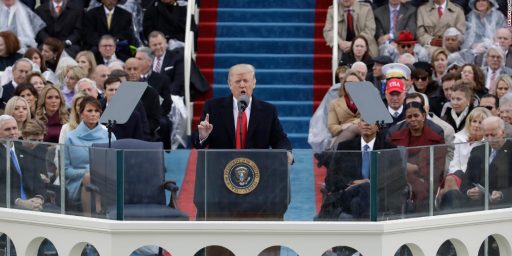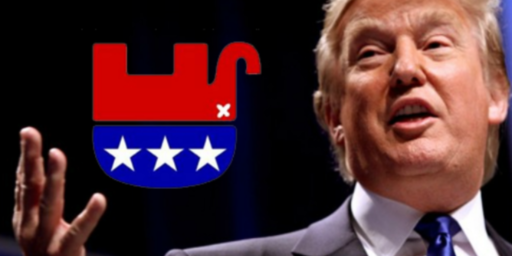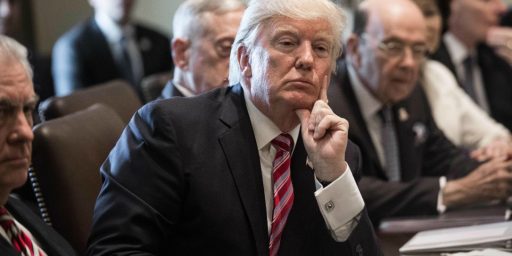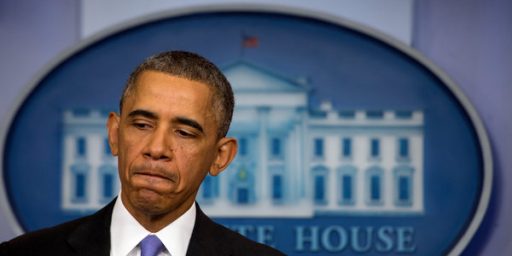President Bush’s Approval Numbers Down
President Bush’s approval ratings are at the lowest point since he took office and below the historical norm for presidents at this point in their second term. Congress’ ratings are even lower.
Bush’s Support on Major Issues Tumbles in Polls (NYT | RSS)
Increasingly pessimistic about Iraq and skeptical about President Bush’s plan for Social Security, Americans are in a season of political discontent, giving Mr. Bush one of the lowest approval ratings of his presidency and even lower marks to Congress, according to the New York Times/CBS News Poll.
Forty-two percent of the people responding to the poll said they approved of the way Mr. Bush was handling his job, a marked decline from his 51 percent rating after of the November election, when he embarked on an ambitious second term agenda led by the overhaul of Social Security. Sixteen months before the midterm elections, Congress fared even worse in the survey, with the approval of just 33 percent of the respondents, and 19 percent saying Congress shared their priorities.
Despite months of presidential effort, the nationwide poll found the public is not rallying toward Mr. Bush’s vision of a new Social Security that would allow younger workers to put part of their payroll taxes into private investment accounts. Two-thirds said they were uneasy about Mr. Bush’s ability to make sound decisions on Social Security. Only 25 percent said they approved of the way Mr. Bush was handling Social Security, down slightly from what the poll found in March.
Moreover, 45 percent said the more they heard about the Bush plan, the less they liked it. The survey also found the public shared the growing skepticism in Washington about Mr. Bush’s prospects for success on Social Security, with most saying they did not think Mr. Bush would succeed.Still, Mr. Bush continued to have majority support for his handling of the war on terrorism – 52 percent – one of his strengths throughout his 2004 re-election campaign.
Mr. Bush’s approval rating is below the historical pattern for June in the first year of a second term: President Clinton’s stood at 60 percent and President Reagan’s at 59 percent. But that could reflect, in part, the much greater partisan polarization in modern politics, underscored by the 71 percentage point gap between Mr. Bush’s approval rating from Democrats and Republicans in the recent poll. Nicolle Devenish, White House communications director, dismissed the significance of the poll, saying Mr. Bush believes that following polls is equivalent to a dog chasing its tail. “We have advanced a broad agenda, and will continue to advocate the people’s priorities,” she said.
On Iraq, months of continued turmoil, insurgent attacks and casualties appear to have taken a further toll on public attitudes. Looking back, 51 percent said they thought the United States should have stayed out of Iraq, while 45 percent said military action was the right thing to do. That reflects only a slight erosion from findings by CBS News throughout the spring, but a marked turnaround from 2004, when pluralities tended to think it was still the right thing to do.
Moreover, only 37 percent said they approved of Mr. Bush’s handling of the situation in Iraq, down from 45 percent in February. A strong majority of Americans now say the effort by the United States to bring stability and order to Iraq is going badly – 60 percent, up from 47 percent in February. [emphasis added]
The complete results of the poll are available here in PDF format.
The Times’ analysis of this poll is quite plausible. The portion embolded in the excerpt strikes me as the key. Americans hate divisiveness in politics and we’re in an era of extreme polarization. People are disgusted with both the president and Congress for “playing politics” and the constant fighting over seemingly minor things, whether it be the John Bolton nomination, the Terri Schiavo case, or judicial fillibusters. Americans want politicians to put their differences aside, work together, and get things done. That’s not happening.
Things are unlikely to get better any time soon. With the likes of Howard Dean and Dick Durbin in the leadership of the Democrats, there is going to be no ratcheting down of the rhetoric. Nor is President Bush likely to back down on his agenda, both because of his natural stubborness and because he rightly calculates that putting forth more “moderate” nominees will harm him with his base without gaining anything in the battle with congressional Democrats, who will just brand the new crop “extremists” as well.
On top of that, of course, is the drip, drip, drip of bad news from Iraq. Bush is the first president since Lyndon Johnson to have a long war factored into his poll numbers. Presumably, once U.S. forces are back home, that weight will be lifted.






http://polipundit.com/index.php?p=8347
Fox News Poll
According to a new Fox News Poll, President Bush has a 48%-43% approval-dsapproval rating.
He has a 52%-42% favorable-unfavorable rating. This is roughly equal to Hillary Clinton’s 52%-37% favorable-unfavorable rating. It is way above Howard Dean’s 23%-41% favorable-unfavorable rating.
The Iraq War and Terrorism are at the forefront of the issues of most concern to Americans. It is yet to be seen whether Republicans can convert these issues into electoral gains as was the case in 2002 and 2004.
On the Supreme Court issue, Americans, by a 54%-43% are comfortable with the idea of President Bush nominating someone. In other words, if the Democrats continue to push the judicial issue, it is to their disadvantage.
On the Guantanamo issue, Americans believe that the conditions at the prison meet acceptable standards by 43%-33%. By 59%-12%, Americans believe that the conditions in Guantanamo are better than those at prisons in Iraq or Afghanistan.
Finally, my Democratic friends, Americans don’t want Guantanamo closed by 59%-22% margin.
Let me repeat that:
Americans don’t want Guantanamo closed by a 59%-22% margin.
— Alexander K. McClure
Posted at 10:04 pm Link to this post | Comments (32)
Meahwhile the winds of change in the M.E. are blowing…
Iraq liberated, holds first successful democratic elections
Afghanistan liberated, holds first successful democratic elections
Libya gives up WMD aspirations
Free elections held in Lebanon
Peace agreement in Isreal
Democratic movement in Iran, also holding elections
Elsewhere:
N. Korea back to talks
EU fails to ratify constitution
This is DISatisfaction with foreign policy?
“Once the troops are home from Iraq”?
What exactly does the Iraqi gov’t govern? It was a big step to hold elections but if they don’t control/run their country, that doesn’t seem to be much of a government. I know it takes time but let’s not exaggerate things too much.